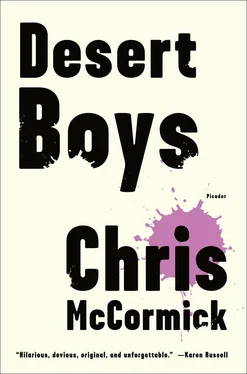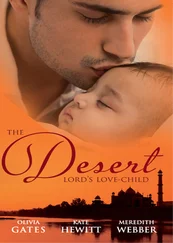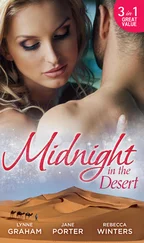The light switches off. You’ve forgotten to wave an arm. In the brief moment of darkness, remember the name of the first boy you loved, Robert Karinger. He used to take you to the desert and show you how to siphon water from plants. He’d pinch the prickled flesh of an ugly cactus at just the right spot, and you’d kneel to catch the stream in your mouth like a wanderer in the holy land.
Lloyd waves his arm, and the light returns. “Her dad was asking you the final question,” he says.
“Right. And Gaspar translated. Only it wasn’t a question. Her father had given me an instruction: ‘Drink the arak.’ I explained to Gaspar that I didn’t drink. I’d made a vow, because my father had been a drunk, and I didn’t want to be anything like him. Gaspar listened to me and slowly relayed my message. And then her father stood up and shook my hand. Gaspar said the old man respected me for my convictions. I had his approval.”
“Bravo!” Lloyd says, for both young Ed’s victory and for old Ed’s telling of the story.
So your father had to pass a test to join the family, and he’s being nice because he doesn’t want to put Lloyd through the same wringer. Why does this make you feel uncomfortable? Call it an early night, and stand up from the table. Brush your teeth, and head to your childhood bedroom, which, aside from a new futon your father probably brought home wholesale from the furniture store, looks and feels eerily well preserved from your high school days. Glide your fingers along the glossy surface of the poster of John Lennon. Scan the colorful spines of the Goosebumps novels and volumes of Encyclopædia Britannica lining your old desk’s oak shelves. Pick up the baseball signed by Mike Piazza and Eric Karros. Karinger always envied you over that baseball, and you would’ve given it to him if he’d asked. He was the only person who could teach you — a boy obsessed with escaping — to love the desert. He was the only person who’d taken you past the tall fences of the driving range to hunt for golf balls, the only person who’d convinced you to brave the aqueduct’s currents and risk your life only to prove you could.
A long time ago, that boy rapped his fingernails against this window. You were sixteen, and you opened it. Maybe you hoped he’d shake the world that night by coming into your bedroom and touching you. Instead, he told you that Dan Watts, licensed driver as of noon that day, was parked in his dad’s pickup at the end of the block, waiting for you to join them on their way to a strip club in Los Angeles. You hesitated — you’d never sneaked out before. You were nervous to break the rules, even though your sister, the only person who would’ve heard your window slide open, had already moved away for college. You were nervous, too, about your ability to mask your apathy for naked women. Your friend promised to have you back soon, and so you climbed through the window thinking, you remember, of that Beatles song.
Later, after failing to convince security to let you into the club, you all three packed into the cab of the truck and drove back home — un-sexed, yes, and un-glittered — but exuberant still, aware for the first time of what you thought would always be true: that you could leave home, return to it, and nothing would be different except for you.
Now, when Lloyd pushes open the bedroom door and peeks in on you, pretend to sleep. Wait until he steps inside, and then say no. He doesn’t say anything, but comes closer. He bends down to kiss you. Smell the black licorice on his breath — lion’s milk. When he asks why you don’t want him, realize you don’t know the answer yourself. Do not lie. Do not improvise. Simply wait for him to step back until he’s out of the room and the door arcs slowly to a close.
In the morning, wake early and find, in the kitchen, a pot of coffee already brewed. Pour yourself a mug. At the counter, look out the window onto the backyard, and see your father and Lloyd at the edge of the pool, acting.
Join them outside and mumble a good morning. Your dad tells you to take a seat — they’re at the climactic scene. Ask how late they stayed up the night before, and feign surprise when they say, in unison, they still haven’t gone to bed. Listen to them recite lines they’ve spent all night revising.
“Love transcends language” is just another way to say love’s a bad listener.
But can love be frozen and thawed? [TEDDY picks up a fistful of snow.] Like snow?
And all this time I’ve been standing out here, freezing half to death, my life was driving right at me in a 1969 Buick LeSabre.
Ignore that these fragments of dialogue fall short of great literature. Instead, choose to love them. Not the particular words, really, and definitely not their delivery, but the simple fact that they exist. Love that you can walk out onto your back patio and spot the two most important men in your life building something together. Think, again, of your mother. Imagine her sitting next to you at the edge of the pool, feet in the water. For the first time, admit to yourself that you thought less of her for being religious, superstitious, for having an accent. You were ashamed of her. Regret that you were ashamed of her.
And know that clichés in English weren’t clichés to her. Know she would’ve been able to do gracefully what you’re working so hard to do now: love.
Realize you’re not capable. You may have been able to love Lloyd in San Francisco, but you can’t love him here. You can love only one man in the Antelope Valley, and Robert Karinger is gone. He always treated you like a little brother — someone to mock, someone to protect, someone to instruct. Bringing Lloyd home has helped you see that you’ve been using him to fill that role. Decide to break the pattern. Decide you don’t need an instructor. In fact, start instructing yourself, Daley. Instruct yourself.
Get Lloyd alone, away from your father and the script. Tell him the truth: you need to stay home for a while. When he says he doesn’t understand, say nothing. Grief transcends language, too.
When your father comes into the living room to find you and Lloyd crying quietly on the couch, let him do the talking. He’s put aside his discomfort and has treated Lloyd like a son. He’s earned this monologue.
“When Gaspar sent me that case of arak after your mom passed, he attached a note. He said he’d been lying to me all these years. Apparently, when I’d given that answer of mine about my father and my vow never to drink, Gaspar knew I’d be doomed. How could I handle a wife if I couldn’t handle a single drink? So he improvised. He told his father and the rest of the men that I’d given a speech about courage. About how I was already a brave man, and that my children — his grandchildren — would grow to be the smartest and strongest and bravest Armenians in the world, raised not on lion’s milk but on Lena’s milk.”
He lets out a single laugh of nostalgia that moves all the air in your lungs up to your throat. This is the most your father has ever said to you without asking a question. Now that your mother is gone, he has become the verbose, explicit man you’d wanted so badly as a boy. Now you have taken on the role he’d played, the man who asks questions, the man whose job it is to listen.
“Your uncle Gaspar lied,” he continues, “and that’s the only reason I was allowed to marry your mother. You owe your entire life, son, to the greatest lie ever told. And I guess that’s what my old play, or Lloyd’s novel, or any kind of fiction is trying to be — a lie that lets love exist. But I was a kid when I wrote that damn thing, and as much fun as I’ve had revisiting it, the kind of love between your mom and me was beyond what a kid — even a sensitive, tuned-in kid like me, like you two — could’ve got down on paper. A lie might allow love, but it can’t create it.”
Читать дальше












